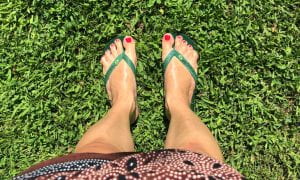
Terry Tempest Williams’ words in her book Red remind us that our surroundings shape who we are and influence the way we behave and interact with the world around us. She writes, “Each of us belongs to a particular landscape, one that informs who we are, a place that carries our history, our dreams, holds us to a moral line of behavior that transcends thought” (19). For me, this landscape is wherever I can immerse myself in the essence of who I am and feel grounded, whether that be in the hiking trails of Rio, backyard vegetable and flowerbeds, or on my deck surrounded by container gardens and potted plants.
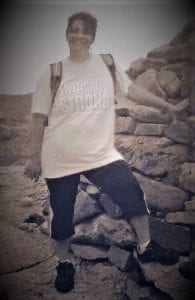
Growing up in one of the oldest neighborhoods in Rio, I was fortunate to have a childhood surrounded by the city’s natural beauty. The warm climate, sandy beaches, and abundant fauna and flora provided endless opportunities for exploration and appreciation of the outdoors. The sounds of wildlife such as the mico-monkey, swallows, and other small animals filled the air, and gave me the chance to listen and observe these amazing creatures up close. I learned from an early age to respect and appreciate nature and its sounds, as well as the wilderness and its quietude. The wildflowers that grew around me added even more beauty to the already stunning landscape, and I learned about the different types of plants and their uses.

On the day my father passed away, a swallow began making a nest on his bedroom window… Unbeknown to us, another nest was in the making in one of my sister’s hanging plants, roughly 10 miles away. And a third one occupied a birdhouse hanging on my front porch in a different hemisphere.
My family has a rich history rooted in agriculture and farming. My grandparents owned a small farmland in Viseu, Portugal, and my father and his brothers grew up working the fields with my grandfather, planting and harvesting their food. As bell hooks writes in Touching the Earth, “the land belonged to everyone…we are part of the Earth and it is part of us” (364). This deep connection to the land and the satisfaction of providing for oneself passed down to my siblings and me – along with the gift of a “green thumb” – and is a fundamental part of who we are, our identity, and our values.
As a young Army wife, I moved around frequently with the military and was allowed only a few houseplants. Once we returned to civilian life, I was happiest when living in Westport, MA. It was there that I felt closest to the earth that created me, and it was there that the land became my groundingscape and my therapy. The soil in my hands and under my fingernails, and the constant dirt stained knees of my pants offered me the peace I needed to feel connected to my roots, to my beloved parents, and to their legacy. Whether planting my vegetable gardens, and flower beds or caring for my indoor plants, there was a constant exchange between the Earth and me. I gave it the nourishment and respect it deserves, and it gave me the grounding peace I needed. I cherished the land, my land, and felt immense gratitude for our Earth for the life-giving soil and the abundance it provided me. Even now, living in a condo in the city, I still replicate, on a much smaller scale, that which connects me to the earth gives me peace, and brings me true happiness.
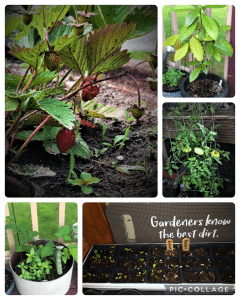
This deep connection to the land and nature brings my life a sense of fulfillment and purpose. By continuing to honor and appreciate the gifts of the earth, my bedrock of democracy bears my history and, in many ways, a part of my legacy as a nurturer of all living things, preserving the natural world for future generations.
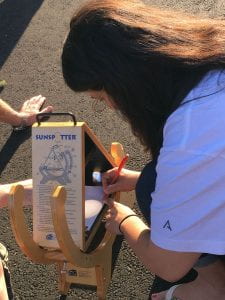
It is important to remember that we are not separate from nature, but rather an integral part of it. The landscapes in which we reside shape us in countless ways, and it is our responsibility to honor and respect them. We must recognize that our actions have consequences and that we must take steps to ensure that our use of natural resources is sustainable and responsible; otherwise, we might disappear along with our landscape. By reducing our carbon footprint, supporting renewable energy, and engaging in conservation efforts, we can help to mitigate the negative effects of human activity on the environment.
In Rio de Janeiro and beyond, it is crucial that we remember that we are not separate from nature, but rather an integral part of it. By honoring and respecting the landscapes in which we reside, we can ensure that they continue to inform and inspire us for generations to come. Only then can we truly appreciate the beauty and wonder of the world around us, and work to protect it for future generations.
Works Cited
hooks, bell. “Touching The Earth.” Orion Magazine, 1996, https://orionmagazine.org/wp-content/uploads/2020/04/bellhooksarticle.pdf.
Williams, Terry Tempest. “Home Work.” Red: Passion and Patience in the Desert, Vintage Books, New York , NY, 2002, pp. 3–19.
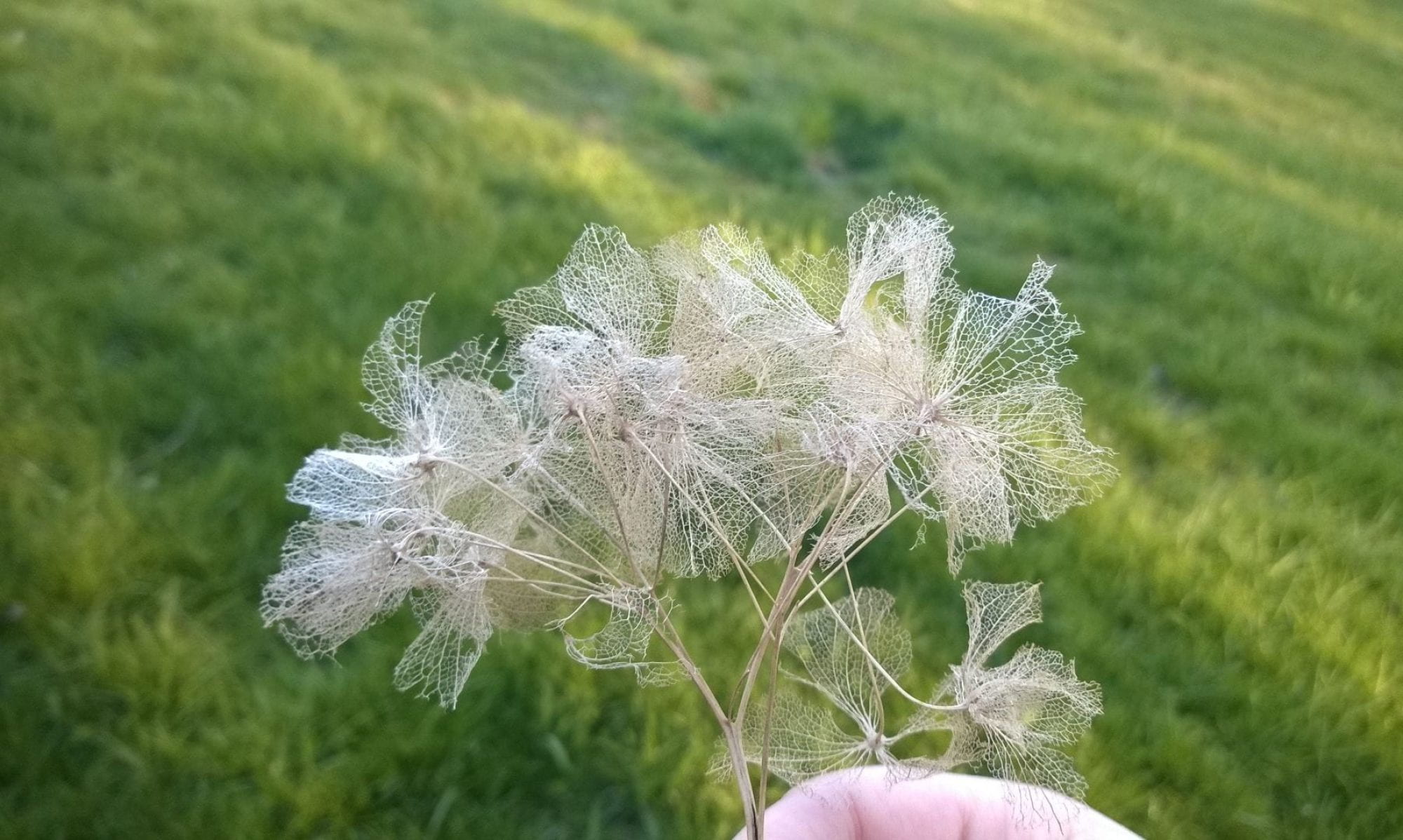
Hi Rose – You did such a great job of connecting yourself to your “place” and explaining what it means to you. I completely agree that a connection to the earth in some way is a form of therapy. I am a total ‘beach bum’, as evidenced by the place I chose to write about this week! I practically grew up in that neighborhood and that beach, and as I got older, that was my first choice of a place to go for a relaxing beach day. Laying out in the sun, floating on the water and even just watching the ocean from the shore can heal you in ways many people might not realize. I only wish I had the chance to really “repay the land” in the way you eloquently stated.
I love the mention about the swallows, as well, that showed up after your dad’s passing. They are known to be symbols of good luck and good fortune, especially on a farm! I think that is a beautiful and poignant synchronicity.
You make a great point at the end, as well, about ensuring sustainability in the use of our resources. I think too make people think the things in nature are there for the taking and will never run out. I hope more people over the coming generations realize this, and are able to enjoy the earth in many different ways. I’m curious what type of conservation or sustainability efforts you are or have been a part of, if any, over years. Being involved in farming must give you a unique perspective!
You write extremely well! This was such a great story of your life, and you brought together the details of the readings and of your connection to the earth in such a perfect way. Great job!!
Hi Amanda,
Thank you for your kind words. Unfortunately, the family farming I refer to was mostly done by my parents and grandparents in Portugal before they moved to Brazil. And although our family home in Rio is on a good size lot, we only have a little over ¼ acre of land that could be used for planting. However, with my father’s love for the farming and amazing creativity, he found ways to maximize the space. We had stackable raised beds, cement planter that ran the length of the property’s brick walls, and we had vertical gardens before they were popular. Looking back now, he even created an intricate system of pipes and hoses to utilize the rainwater runoff to irrigate the fruit and vegetable gardens. We were one of the very few families in our neighborhood that grew a variety of vegetables, fruit trees, including bananas, pears, and mango. We needed very little from the farmer’s market to supplement our grocery needs, especially since we also had small chicken coop, and fresh eggs were never in shortage. Some of my earliest memories are of me chasing the chickens in the backyard when my sister would accidently leave the “quintal” gate open.
Although I did not grow up on a full-scale farm, my father’s love and care of our quintal helped us become aware at an early age of the importance caring for the land and what it gives us. He never used pesticides and took great care in ensuring the chickens had quality feed. He also always made a point to have certain flowers for the bees to pollinate.
As an adult, I became more conscious of my own consumption habits and have tried to reduce my environmental impact in small ways, such as using reusable containers and bags and reducing my use of single-use plastics, recycling, etc.
Overall, I believe that it’s important for all of us to take responsibility for the impact of our actions on the environment and to work together to promote sustainability and protect the earth for future generations.
Thank you for your thoughtful response and for the opportunity to further share my experiences and perspective. 😊
Teresa,
Thank you for your heartfelt response. Your kind words and thoughtful insights are truly appreciated. I’m glad that my experience with the swallows resonated with you, and that you were able to connect it to the writings of Williams and hooks. It’s fascinating how nature can be such a powerful symbol and source of comfort in times of grief and hardship. You mentioned in your blog that to watch your sister during your beach stay was to know that she “needed the wild” to find peace, and that those places are where you find her, even now. That is a powerful truth and a testament to your bond and connection to each other and to nature.
I would like to share with you one of the many poems I wrote following my mother’s passing. Some were written from the perspective of a mother leaving her children but can also be interpreted as messages from any departed loved one. This is one of them… She loved nature and moving bodies of water such as the ocean, flowing rivers, and creeks. She enjoyed watching spinning water wheels and the sounds they make; she compared them to life itself, constantly moving and generating new opportunities, connecting and reconnecting us to nature, always giving and forgiving.
She fought a short battle, but one that forever changed me.
** For further context, the poem is accompanied by a photo of a moving water wheel in a wooded area, but I was unable to figure out how to attach the photo to the blog response.
“Water Wheel”
Walk with me in comfort silence,
along the river’s edge.
Walk with me, let’s seek the wisdom
of souls among the sedge.
Listen closely to the soothing sound
of water tumbling free.
Walk beside me and you will hear,
my silent and desperate plea.
Breathe in the air, take in the sights
there’s so much left to see.
Hand in hand in comfort silence,
embrace this peace with me.
And just as the wheel spins slowly,
increasing the water’s flow.
Rest in love with me my Darling,
for I’ll never let you go.
~ R.M. Costa©
I also appreciate your understanding of the importance of having a connection to the natural world. Growing up in Rio, I was fortunate to be surrounded by so much natural beauty, and it’s something that has stayed with me throughout my life. As you mentioned, even when I moved to new places, I tried to bring a piece of that natural history with me.
Your sharing of your own childhood memories of the garden is beautiful. It’s amazing how a single scent or sensation can transport us back in time and evoke such strong emotions. I completely understand your love for your potted plants on your patio and the feeling of being rooted in “the wild.”
Your concerns for the state of the earth are shared by many of us, and it’s important that we all take responsibility for respecting and protecting the landscapes in which we live. As you quoted from Williams, I too hope to keep my words wild and honor the beauty of the world, even in the face of destruction.
Lastly, I appreciate you sharing the poem “The Peace of Wild Things” by Wendell Berry. It’s a beautiful and poignant reminder that even in times of despair, there is peace to be found in the natural world, which circles back to my poem above.
Thank you again for your thoughtful response and shared experiences. <3
Rose,
First of all I want to tell you that I am so sorry about the passing of your father. The images you shared of the swallows making their nests in various locations are quite extraordinary. What an incredibly symbolic image (memory) that illustrates the connection between you, your father, and your sibling as it applies to the natural world. This reminded me of Williams when she said, “that our capacity to face the harsh measures of life, comes from the deep quiet of listening to the land…” (Williams, 17). We learn so much about the harsh realities of life as well as the beautiful joys of life, through nature. Your father’s death marked by the birds making a home – in possible preparation for new life. The harsh realities of life and death as they come together. What a tribute in that the natural world which connected you to your childhood and to your family/culture marked that place in time. hooks said, “even though life in the new world was ‘harsh harsh’, in relationship to the Earth, one could be at peace”, (hooks, 364). You were able to find peace amidst your grief when observing the birds.
I must tell you that as you describe growing up in Rio, I am immensely jealous of all that you experienced as a way of life. You had and still have such an incredible connection to the earth and the water. You describe with such detail the sounds of the animals, the flowers, the landscape, that one can really appreciate and understand the place that you called home and that you carry with you wherever you go. Its imprint on you as it became a part of you and your history is quite evident.
Even as you moved to Westport, you brought with you pieces of your natural history. You brought pieces of your “place” with you. Let me also thank you for your service in the military! I can only imagine how difficult it is to be so transient. Moving from place to place can make one feel displaced. It is an incredible sacrifice that you made. I can only imagine how you felt once you were able to lay down some “roots” both figuratively and literally. It is no surprise that you gravitated back to what was natural to you. When you describe the dirt in your fingernails, it brought me back to my childhood. We lived in the suburbs but had a huge garden. It went the length of the entire side of the house from front to back. We had vegetables all summer long that were utilized to make tomato sauce, canned pickles, and so on. I can still remember walking the dirt paths that were warm beneath my bare feet. The smell of the tomato plants. I would pick them off of the vines and pop them in my mouth. They were warm from the sun and so unbelievably fresh. I get it. It is why I have my potted vegetable plants on my patio every summer. Sometimes I rub the leaves of my tomato plants just to get the smell of it on my hands. It instantly brings me back to my childhood. It is like a time machine! I think we both share this love and are rooted in “the wild” (Williams, 19).
Like you, I also share grave concern for the earth. You see the bigger picture and understand the gravity of what it is becoming. You said, “The landscapes in which re reside shape us in countless ways, and it is our responsibility to honor and respect them.” This was a very powerful statement and further demonstrates your connection to and respect for the wild. As Williams said, “I want to keep my words wild so that even if the land and everything we hold dear is destroyed by shortsightedness and greed, there is a record of beauty and passionate participation by those who saw what was coming” (Williams, 19).
I love Wendell Berry and want to share this poem with you as it reminds me of your keen insight into what was, what is and what can be. The earth is our history and is there we can learn about what could be once again. It is called “The Peace of Wild Things.”
The Peace of Wild Things
When despair for the world grows in me
and I wake in the night at the least sound
in fear of what my life and my children’s lives may be,
I go and lie down where the wood drake
rests in his beauty on the water, and the great heron feeds.
I come into the peace of wild things
who do not tax their lives with forethought
of grief. I come into the presence of still water.
And I feel above me the day-blind stars
waiting with their light. For a time
I rest in the grace of the world and am free.
Work Cited:
Berry, Wendell. New Collected Poems. Counterpoint, 2013.
hooks, bell. Touching the Earth.
http://jdyck.weebly.com/uploads/1/9/1/5/19153179/touching_the_earth.pdf.
Kingslover, Barbara. Knowing Our Place.
https://svacanvas.sva.edu/content/mfa_ap/fa16/apg5350/s1/downloads/Session_pre-02_H03_Kingsolver_2.pdf.
Williams, Terry Tempest. “Home Work”. “Red: Passion and Patience in the Desert.” 2002, pp. 3–19.
https://umassd.umassonline.net/webapps/blackboard/execute/content/file?cmd=view&content_id=_1671812_1&course_id=_26072_1
Teresa,
My apologies for not clarifying this in my response….
I did not serve in the military, I was a military wife and my oldest son, Daniel, was born in Germany.
During my ex-husband’s deployments, which happened often, I would take Daniel, who was a toddler at the time, on long bike rides for miles and miles of trails through the countryside. Those rides were his first experiences with nature and the environment.
He now holds a degree in Biology and a minor in Environmental Conservation.